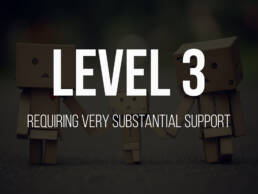Jonah has been making some big strides in his development in the last few months. He has been able to blow kisses, he’s starting to pretend play, he sings, he is adding new words to his vocab, and he is imitating more and more.
I was responding to a question somebody posted on one of my Facebook posts about the acceleration of his recent development and found my response kept getting longer and longer. So I decided to just turn this into a blog post.
Here was the question/comment:
“…Since Jojo has been making such HUGE strides in the last few months, do you have any idea what the catalyst was for these changes? Also with all of these advancements do you think the original diagnosis of “severely” autistic fits?”
It’s hard to say really, where he now falls on the spectrum.
Honestly, I wouldn’t have thought he was severe even when he was diagnosed.
But, then again, we went to a major research hospital for his diagnosis and they have seen probably hundreds of thousands of cases.
Whereas I have only met a handful other autistic individuals. So I guess I don’t know what is grounds for a “severe” label. Jojo is just “Jojo.”
The “severity” and even the LABEL of autism really isn’t a thing anymore for me, except to get him services he needs for development.
The new Diagnostic and Statistical Manual of Mental Disorders (DSM-5) only has 3 levels of severity.
Level 1 – Requires support
Level 2 – Requires substantial support
Level 3 – Requires VERY substantial support
Curiously, before diagnosis, he had never had a serious meltdown, he didn’t lash out by hitting and he had never once self-harmed.
Yet, he was STILL given a severity level of 3 (Requiring very substantial support), which I suppose he does require, though that rating seems like a VERY subjective standard.
I wish I knew what the catalyst was for the growth we have experienced so I could let everyone know what has worked for us and I could put it in a bottle and send it to them.
However, since his diagnosis, we have ALSO experienced the more challenging parts of “severe” autism (meltdowns, self-harm, lashing out violently — though we have been able to work through them to even make progress in these areas).
I love all the progress Jojo has been making.
I think I have a tendency to report more of the progress and NOT report as many of the setbacks. I try to represent a genuine point of view but by nature, I am a (mostly) positive person. But we do have them (the setbacks).
Honestly, I think we have plateaued a bit as far as his speech goes, but this is not completely unexpected. Some words he picks up and unfortunately, others he will simultaneously lose or will just not see the need to verbalize anymore.
Do I call him nonverbal still? Yes.
We still praise him for every word he says, especially new ones.
I think that the threshold for verbal/nonverbal is when you no longer NOTICE that your child is communicating exclusively through spoken words.
He is not EXPECTED to verbalize, so when he DOES, he is exceeding expectation.
Do I still consider him to have “severe” autism? Yes.
Functioning labels are a tricky path to navigate, since it is subjective to begin with, but according to the DSM, he still needs VERY substantial support, which would still classify him as level 3, though the spectrum of autistic individuals is also going to vary greatly even within “Level 3 – Needs VERY substantial support” itself.
Jojo’s progress is both a blessing and a curse. Actually, I wouldn’t call it a “curse,” but just more of a challenge.
On one hand, people outside the community don’t see a stereotypical “autistic” boy when they look at Jojo. He doesn’t really stim. He makes great eye contact. He responds to his name. He is easy to make laugh and smile.
Most people certainly wouldn’t categorize him as “severe” if they only spent a short time with him.
They wouldn’t see the meltdowns. They wouldn’t see the screaming / hitting / kicking / running / slapping / throwing that can happen when he feels “cold pricklies” instead of “warm fuzzies.” They would probably just see an unruly kid out of control that his parents need to discipline better.
That is where they would be wrong. He doesn’t just “need discipline.” He needs “VERY substantial support.”
